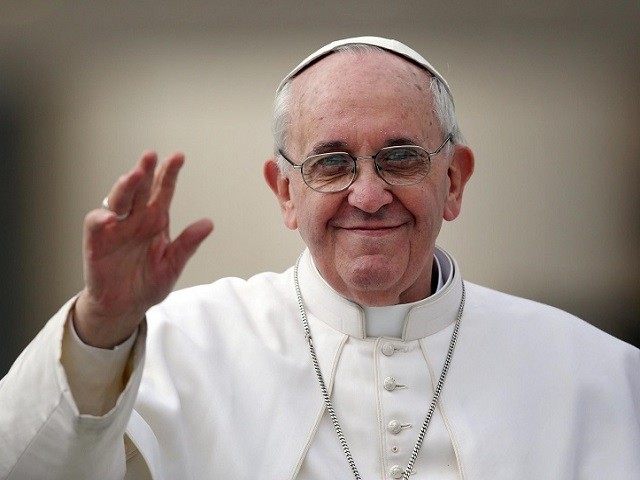In a Catholic-Jewish double-header, Pope Francis met in a private audience this morning with Israeli President Reuven Rivlin, and later in the morning with Britain’s Chief Rabbi Ephraim Mirvis, accompanied by Cardinal Vincent Nichols, head of the Catholic Church in England and Wales.
An official Vatican communiqué said that the “cordial discussions” between the Pope and President Rivlin “focused on the political and social situation in the Middle East, affected by several conflicts, with special attention to the condition of Christians and other minority groups.” The men reportedly “acknowledged the importance of interreligious dialogue, along with the responsibility of religious leaders in promoting reconciliation and peace.”
Francis stressed the “need and urgency of promoting a climate of trust between Israelis and Palestinians” along with the “resumption of direct negotiations with the aim of reaching an agreement respecting the legitimate aspirations of the two peoples, as a fundamental contribution to peace and stability in the Region.”
Both parties expressed their hope that the bilateral Agreement currently being drafted be concluded promptly, and that an adequate solution be found for various matters of common interest, including the situation of Christian schools in the country, the communiqué stated.
The Jewish Press noted that in remarks prior to his trip Rivlin referred to Pope Francis as an “inspirational leader who believes in dialogue between different faiths and whose activities and statements are aimed at the promotion of this dialogue.”
The two men exchanged gifts during the visit, which lasted about 30 minutes with both meeting in the Pope’s private study.
Thursday’s meeting was the first between the new Israeli head of state and the Pope, who had developed a relationship of trust with Rivlin’s predecessor, Nobel Peace Prize winner Shimon Peres.
In June, the signing of a first accord between the Church and the State of Palestine strained relations between the two countries, with Israeli officials saying that the move jeopardized future relations between the Holy See and Jerusalem.
Later Thursday, around midday, Pope Francis received Britain’s chief Rabbi Ephraim Mirvis, and the two faith leaders discussed Jewish-Catholic relations and the role of faith in public life.
This was the first meeting between the two men, and was scheduled just before the 50th anniversary of the Vatican document Nostra Aetate, to highlight the dramatic transformation of relations between the two faiths.
The signing of the document by Pope Paul VI in October 1965 marked the beginning of a new era of co-operation between the two faiths. Among other things, the declaration insisted the “God holds the Jews most dear” and that “He does not repent of the gifts He makes or of the calls He issues.”
The text also states that the Jewish people cannot be held responsible for the death of Christ and that the Church “decries hatred, persecutions, displays of anti-Semitism, directed against Jews at any time and by anyone.”
Rabbi Mirvis has said he looks forward to the meeting, and that the world has changed radically in the last 50 years, presenting new difficulties for people of faith.
“Today we face challenges that could not have been accounted for by Nostra Aetate fifty years ago,” said Rabbi Mirvis, “such as the widespread secularization of our society and the dramatic increase in prejudice against minority faith communities.”
The Chief Rabbi also underscored the importance of continued solidarity between the two faith communities. “We treasure the spirit of collaboration between our faiths and I look forward to discussing these and other pressing issues with Pope Francis,” he said.
Rabbi Mirvis coauthored a joint article for the Telegraph prior to traveling to Rome, in which they said that publicly identifying with any religion has become an “act of courage” in many western countries because believers are now routinely assumed to be “naive, unsophisticated and narrow minded.”
The two leaders warned that it is becoming increasingly difficult to voice arguments based on faith in debates about vital social and political issues such as assisted dying or family values.
They also said the “brazen persecution” of Christian, Muslim and Jewish minorities in the Middle East and other regions was “one of the most pressing and shameful issues of our time”
For his part, the Pope has written that Christians “hold the Jewish people in special regard because their covenant with God has never been revoked, for ‘the gifts and the call of God are irrevocable.’”
As Christians, Francis said, “we cannot consider Judaism as a foreign religion… With them, we believe in the one God who acts in history, and with them we accept his revealed word.”
Francis has also expressed his deep regret for Jewish persecution, especially at the hands of Christians.
“Dialogue and friendship with the children of Israel are part of the life of Jesus’ disciples,” he said. “The friendship which has grown between us makes us bitterly and sincerely regret the terrible persecutions which they have endured, and continue to endure, especially those that have involved Christians.”
Private audiences with the Pope are relatively rare and during his tenure Chief Rabbi Lord Jonathan Sacks had just one with Pope Benedict XVI.
Follow Thomas D. Williams on Twitter @tdwilliamsrome

COMMENTS
Please let us know if you're having issues with commenting.